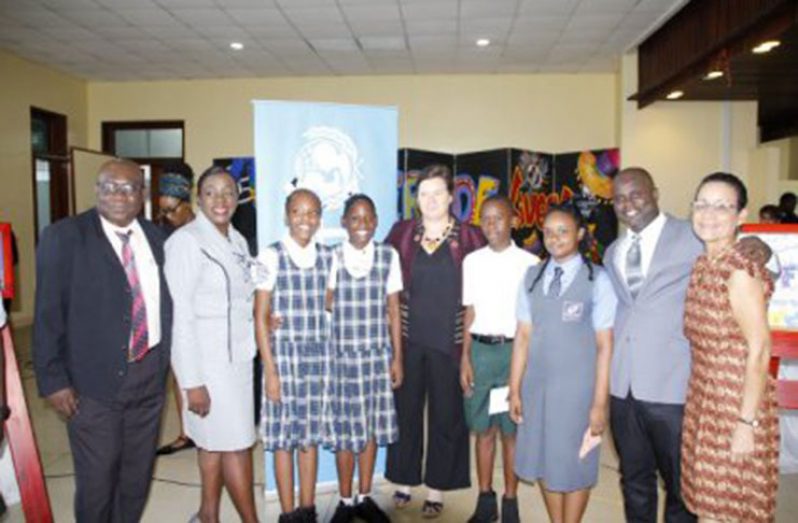– taking a bottom-up approach to the subject
“OUR children advocating for discipline sets the tone for a better society…Don’t use the cane is more than just music, but a teaching tool and motivator for all stakeholders.”
These were among the comments made by Nicolette Henry, Minister of Education, as the Government of Guyana and UNICEF hosted the world premiere of videos about ‘A story of positive discipline’ and ‘Don’t use the cane’ at the National Cultural Centre.
Coping with student discipline in the classroom is a concern to all administrators of education, and the Ministry of Education recognises this integral part of the UNICEF Convention on the Rights of the Child international treaty, which recognises the human rights of children.
In this regard, Minister Henry iterated at the videos’ launching that every school in Guyana is serious about nurturing children in safe, protective and friendly learning environments, where each child has the right to be disciplined in a manner that respects their dignity.
Further, the minister noted, “Outdated forms of discipline and corporal punishment have no place in our schools, moving forward. “It is essential to recognise and address the challenges teachers face daily, and give them the support needed to change the cultural modus operandi of discipline in schools.”
Ultimately, she said, the Ministry of Education’s goal is to reverse the trend of corporal punishment, and together with all partners find and implement the right strategies that will encourage the nation’s children to be excited about school, and to participate positively and think analytically, hopefully to make sound decisions and build their self-esteem.
After a year of activism through national debates, jingles and poster competitions, our children advocates for positive discipline set the tone for systemic programming in positive discipline, nationally. They have also been able to use music, art, research and persuasive presentations catering to multiple demographics and levels of intelligence.
Ms. Sylvie Fouet, UNICEF Guyana-Suriname Representative and Minister Henry agreed that through a bottom-up approach to positive discipline in schools, the videos will actively engage teachers, parents and students for public sensitisation among the many strategies.
In 2016, a one-year multi-strategy child advocacy for positive discipline campaign in primary schools was launched through the use of various forums, moving beyond the classroom setting to music and video production with the help of key stakeholders such as Vision Sounds.
The results are to be seen via dissemination, moving forward to encourage buy-in and ownership of the programme. The hope is that the efforts thus far can serve as a motivator for everyone to want to be involved in what has great promise for the children and the education system in Guyana.
In Guyana, 69 per cent of children between the ages of one to 14 experience violent discipline, and some of this violence occur in school, where bullying, aggression and other violent behaviour seem to be on the increase; where corporal punishment is accepted, often leading to some school-age children dropping out of school.
Ms Fouet posited that a child-friendly environment, respectful relationships among children, teachers and parents will bring about positive learning and increased results for children.
“If we are to change the situation for children,” she said, “we must do so with children, and as such, the partnership with the Minister of Education and team in nurturing an approach that promotes respectful, caring interactions among children, parents and teachers, resulted in a joint effort to promote “positive discipline’ in a model which focuses on positive points of behaviour.
“The production of the videos resulted from more than a year of working together with children to stimulate their creative nature to research and promote the benefits of positive discipline.
“There are 209 teachers who are already using positive discipline and engaging parents and children in 180 classrooms, from Grades 1-6.
“The results yielded are the establishment of PD committees, including members from the community.”



.jpg)










